Since the conflict began in February 1996, aid agencies estimate that between 200,000 and 1.8 million people have been displaced. Despite the overwhelming numbers, humanitarian aid for IDPs is grossly inadequate and there is only one IDP camp in the country with just 1,000 residents. The Rajhena Camp, established in 2004 with funding from Ockenden International, is located 20km from Nepalganj and is comprised of 130 mud and brick homes.
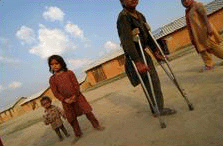 Bachu Rokoya, originally of Mugu District, has been a resident of the Rajhena Camp for 1 1/2 years. She is shy and solemn in recounting the story of how her husband, Danraj, was killed two years ago. "My husband was working as a postman. The Maoists thought he was an informant, using his position to give information to the security forces. But he wasn’t, it was just his job."
Bachu Rokoya, originally of Mugu District, has been a resident of the Rajhena Camp for 1 1/2 years. She is shy and solemn in recounting the story of how her husband, Danraj, was killed two years ago. "My husband was working as a postman. The Maoists thought he was an informant, using his position to give information to the security forces. But he wasn’t, it was just his job."
Individuals are often targeted by the government and Maoists if they are even merely suspected of being sympathetic to the other side. This ‘If you’re not for us, you’re against us’ attitude often results in the victimization of innocent civilians.
"I was there when he was kidnapped," Bachu says, "My children were also there. The Maoists came to our house at midnight; I have no idea how many of them came. First they were knocking on the door, and then they were shouting ‘Where are you, Danraj?’"
"When my husband went to the door, they took him away. That night, they kidnapped six other men from our village. They were all murdered, I’m sure, but we never found the bodies."
"After my husband was killed, the Maoists took my home, my property, some money and my land. I have six children, and we could not survive there after that. That’s when we came to the camp."
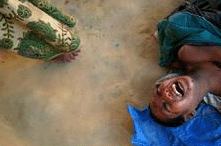 While donations to the Rajhena Camp have tapered off significantly and conditions there are deteriorating, residents of the camp are some of the few IDPs to benefit from aid in Nepal. A United Nations study conducted by Walter Kälin, the UN Secretary-General’s Special Representative for Human Rights of IDPs, revealed in March that there hasn’t been a coherent, structured response to the IDP situation in Nepal by either government or international organizations.
While donations to the Rajhena Camp have tapered off significantly and conditions there are deteriorating, residents of the camp are some of the few IDPs to benefit from aid in Nepal. A United Nations study conducted by Walter Kälin, the UN Secretary-General’s Special Representative for Human Rights of IDPs, revealed in March that there hasn’t been a coherent, structured response to the IDP situation in Nepal by either government or international organizations.
Up to two million of those who’ve abandoned their home villages are now living and working as migrant labourers in India and Gulf countries. Others have gone to live with relatives or gravitated to city centers, with thousands languishing in shanties on the banks of the Bagmati and Bisnhumati Rivers in Kathmandu.
Lokraj B.K, 19, moved to the Rajhena Camp 1 1/2 years ago from Mugu District. "Maoists were pressuring me to join the People’s Army," he says, "but I did not believe in their cause or want to join. First they came to my home to pressure me, to try to convince me, but I resisted, so they kidnapped me for one month. I was made to act as a sentry watching out for the security forces and police. They made me carry heavy loads and join in during mass meetings where they taught about Maoists politics."
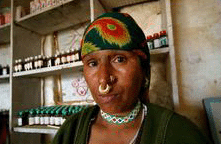 Lokraj has also been forced to migrate back and forth between Nepal and India for work. "I have no money, no opportunity here, so that is why I go. I have five family members to support." Lokraj says that he spends three months at a time in India working then returns to the Rajhena camp for seven to ten days to see his family before making the journey by foot and bus back to India again. He has now made the trip to India 7 times and will be returning again in a few days.
Lokraj has also been forced to migrate back and forth between Nepal and India for work. "I have no money, no opportunity here, so that is why I go. I have five family members to support." Lokraj says that he spends three months at a time in India working then returns to the Rajhena camp for seven to ten days to see his family before making the journey by foot and bus back to India again. He has now made the trip to India 7 times and will be returning again in a few days.
Baishagi Buda’s tone grows heated when asked about her husband Bisim, also a migrant labourer. "He went to India last month to work and won’t be returning for another 3 months. Ten times he has been forced to do this because we have no opportunity for jobs here!"
Baishagi, 26, from Mugu District, also has three children to care for. "When my husband is away," she says, "our main problem is food. We also have no healthcare, and I cannot find work. My children have been ill…with piles, dysentery, diarrhoea."
The Rjhena Camp’s residents suffer from frequent health problems and a recent survey by Terre des hommes, a Swiss non-government organisation (NGO), found poor nutritional conditions among children in the camp, particularly in families where the husband is working in India. 73 percent of children were malnourished and 16 percent emaciated.
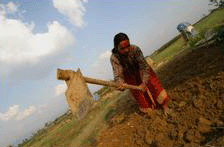 "Malnutrition is a major problem," says Manjan Shashi, an IDP and the community medical assistant at the Rajhena Camp. "Dysentery, pneumonia, diarrhoea-all are very common here," he says. "I have supplies of general use medications
hydration tablets, paracetamol, multi-vitamins, cold medicine, cholera medicine
but I don’t have the necessary items to deal with some of the problems I see. NGOs provide some food, but the last five months the donations have not been enough so people are trying to find work in the local villages, and more and more people are going to India to work."
"Malnutrition is a major problem," says Manjan Shashi, an IDP and the community medical assistant at the Rajhena Camp. "Dysentery, pneumonia, diarrhoea-all are very common here," he says. "I have supplies of general use medications
hydration tablets, paracetamol, multi-vitamins, cold medicine, cholera medicine
but I don’t have the necessary items to deal with some of the problems I see. NGOs provide some food, but the last five months the donations have not been enough so people are trying to find work in the local villages, and more and more people are going to India to work."
Comrade Pravat, a Maoist and the VDC Secretary for Area 10 in Sallyan District, is quite frank in his opinion of the government’s lack of development and health care. "We have many, many problems in Nepal," he says. "We have no health care, no proper education. We have no freedom, no democracy, no human rights. The government neglects the poor people of the country. There is gender, race and class discrimination. When people become sick, they cannot find even one tablet of medicine easily in some areas. Our ability to earn money depends on education and we cannot compete. In the countryside the schools are like caves."
Pravat goes on to talk about the migrant situation, saying "Excessive amounts of people set out from here for India. So many people depend on residuals sent from [relatives]."
A number of other villagers listening in echo his thoughts with their nods. Bahadur, a 34-year-old father of five from Shaunepari village speaks up and says, "Every year for two to three months we go to India to work. We are working as servants, carrying heavy loads, working construction, cutting grass, digging, picking apples-for about 100rps (INR) per day. We don’t like to go. We have obligations here, we have families. We feel so much worry when we are away. But we have no choice, we cannot make a living here so we must go."
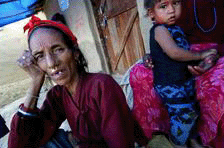 When asked about government oppression in the area, Comrade Pravat mentions the well documented case of Khala K.C. of Damachour who was killed by the police in 1998. "She was an active Maoist and she was several months pregnant at the time," he says. "The police seized her somewhere out in the open, then beat her and raped her. We didn’t find the body for many days. There were also two elderly men killed at about the same time, arrested and beaten to death."
When asked about government oppression in the area, Comrade Pravat mentions the well documented case of Khala K.C. of Damachour who was killed by the police in 1998. "She was an active Maoist and she was several months pregnant at the time," he says. "The police seized her somewhere out in the open, then beat her and raped her. We didn’t find the body for many days. There were also two elderly men killed at about the same time, arrested and beaten to death."
Another villager says, "Everyone feels fearful when they travel to their district headquarters, and also, when they are going back to their own villages, they feel a kind of fear. Both sides raise the gun, both sides are involved in violent activities." His statement echoes a sentiment heard over and over-that both sides are inept when it comes to winning the hearts and minds of the Nepali people.
In the Rajhena Camp, humanitarian conditions only seem to be worsening and lately there have been instances of discrimination and favoritism. Speaking under the condition of anonymity one camp resident says, "The aid isn’t distributed equally these days. There are "Big Men" on the village committee and when we receive a donation they take a larger share for themselves."
Residents also report that some men in the camp have denied rations to pregnant women. Many of the women are already anaemic and some-struggling to make a living-have begun working as prostitutes in Nepalganj catering to the security forces stationed nearby.
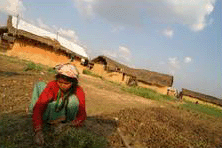 Those with special needs do not receive proper care. There is one mentally disabled child in the camp, and because his family lacks the means to provide him with the proper care, he spends most of his time languishing in bed or on the dirt floor of his family home, his mother dutifully fanning the flies away from his face.
Those with special needs do not receive proper care. There is one mentally disabled child in the camp, and because his family lacks the means to provide him with the proper care, he spends most of his time languishing in bed or on the dirt floor of his family home, his mother dutifully fanning the flies away from his face.
Another child who’s leg was amputated as the result of an accident when he was young-an operation that could have been avoided had healthcare been available at the time of the injury-could easily benefit from a prosthetic if such care were available.
Sitting hunched over his rickety wooden desk, resting his head in his hands, Manjan Shashi is pessimistic about what lies ahead. "The future is very dark for these people, including myself," he says, "very dark."
All photos by Will Baxter.
